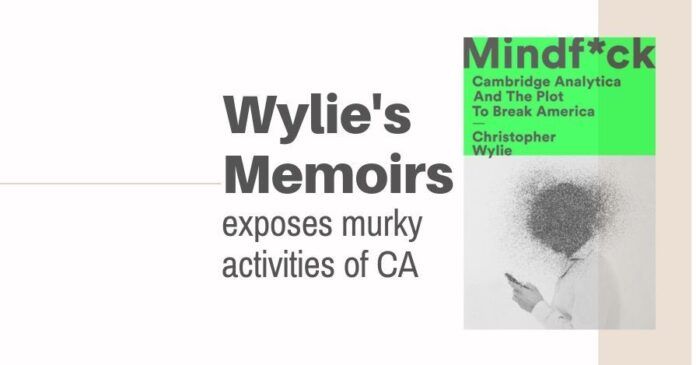
More skeletons tumble down from the cupboard of Congress party’s United Kingdom (UK) based strategy consultant company, the infamous Cambridge Analytica. Whistleblower Christopher Wylie tells the inside story of Cambridge Analytica, particularly the data mining and psychological manipulation behind the election of Donald Trump and the Brexit referendum, the nexus with Facebook and the vulnerabilities democracies face, in his memoir.
The book written by Wylie exposes how such firms engage in mudslinging and creating fake narratives to change people’s mindsets. “Mindf*ck: Inside Cambridge Analytica’s Plot to Break the World“, published by Random House, goes behind the scenes into the minds that built and used data as psychological warfare tools, into rooms that rigged the elections.
“But Steve Bannon shot that notion down right away. ‘Have it ready by September,’ he said,” writes Wylie.
Wylie, who worked for Cambridge Analytica as a data scientist, later decided to become a whistleblower prompting the largest data crime investigation in history. His story is both an exposé and a dire warning about a problem born of very new and powerful capabilities. The book goes on to narrate how the dirty tricks were employed and created fake propaganda through the Social Media(SM) and Mainstream Media (MSM) to target opponents. It has not only exposed the profound vulnerabilities and profound carelessness in the enormous companies that drive the attention economy, but it has also exposed the profound vulnerabilities of democracy itself.
“This was an epic moment. I was proud that we had created something so powerful. I felt sure it was something that people would be talking about for decades,” was how Wylie felt after Cambridge Analytica collected the complete Facebook accounts of millions of users, mostly from America. When billionaire Robert Mercer acquired a project to use personality profiles built from Facebook interactions to target and sway potential voters ahead of US mid-terms polls in 2014, everyone assumed they had a couple of years to get the project fully running.
“But Steve Bannon shot that notion down right away. ‘Have it ready by September,’ he said,” writes Wylie. He then goes on to cite details of a boardroom meeting in London when Trump aide Bannon and Cambridge Analytica CEO Alexander Nix got a live demonstration of how data was collected from people. “It was surreal to think that these people were sitting in their kitchen in Iowa or Oklahoma or Indiana, talking to a bunch of guys in London who were looking at satellite pictures of where they lived, family photos, all of their personal information,” writes Wylie.
“Looking back, it’s crazy to think that Bannon – who then was a total unknown, still more than a year away from gaining infamy as an adviser to Donald Trump – sat in our office calling random Americans to ask them personal questions. And people were more than happy to answer him,” he says.
“We had done it. We had reconstructed tens of millions of Americans in silico, with potentially hundreds of millions more to come,” Wylie goes on to say. Cambridge Analytica was created to launch Bannon’s ideological assault on America. But as it honed its dark arts in elections from Trinidad to Nigeria, Wylie began to see what he and his colleagues were unleashing. He had heard the disturbing visions of the investors. He saw what Nix did behind closed doors. When Britain shocked the world by voting to leave the EU, Wylie realised it was time to expose his old associates.
But the writer’s opponents accuse him of creating another narrative in the run-up to forthcoming US President Elections and the recent chaos in the UK Politics. However, the book is a good read on how the business interests and geopolitical interests play out in every country’s politics and elections and trying to control the voters’ mindset in elections. This book exposes the dirty world of lobbying, covert public relations exercises and murky ways of propaganda spinning in elections in many countries by taking money from political parties and pressure groups against their opponents.
[with inputs from PTI]










